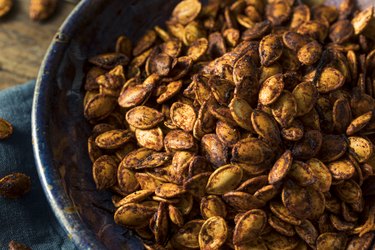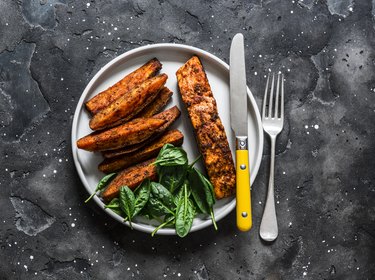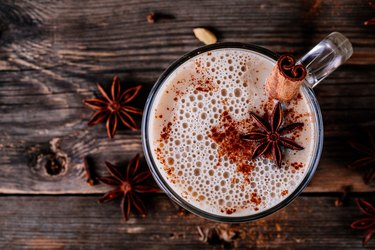
Your day is chugging along just fine — and then you receive that email. Or maybe you're in a particularly busy season of life and your daily stress levels are higher than normal. One way you may choose to soothe your stress: with a snack. Or maybe takeout.
Let's be real, though. You're probably not reaching for a nice plate of baby carrots and red pepper strips. Your body and brain might be asking for foods higher in sugar and/or fat. You know, ice cream, chips, cheese curls, candy.
Video of the Day
Video of the Day
"While comfort foods may help with stress in the short term, longer term the effects don't last and can lead to weight gain and poor health," Melina Jampolis, MD, physician nutrition specialist and host of the podcast Practically Healthy by Dr. Melina, tells LIVESTRONG.com.
Stress-coping strategies go beyond food, of course — give a friend a call, take a break, spend five minutes outside — but you will need to eat.
There are certain nutrients that will nourish a stressed-out body. Focus on "nutrient-dense foods rich in healthy fats, especially omega-3 fatty acids, along with lean protein, B vitamins and magnesium-rich foods to better manage chronic stress," Dr. Jampolis says.
Here's a closer look at the foods that help fight stress when your day dips into overwhelming territory.
1. High-Fiber Foods
One of the types of stress-relieving foods you might automatically reach for are those that are rich in carbs. That's not a bad thing. No shame about diving into a bag of cookies at this time, but there is a better way to support your mood. And that's with high-fiber foods.
"High-fiber foods can help prevent a rapid rise and subsequent fall in blood sugar, which can exacerbate stress and increase cortisol," Dr. Jampolis says.
In general, fiber-rich, blood sugar-balancing foods include:
- Fruits
- Vegetables
- Beans and lentils
- Whole grains like bulgur, brown rice, oatmeal and whole-wheat products
This doesn't mean you have to chow down on Brussels sprouts if you're not a fan. Rather, think about swaps you can make for the comfort foods you're craving.
For instance, "if you want something like mashed potatoes, do mashed sweet potatoes and keep the skin on for added fiber," Dr. Jampolis suggests. Also sprinkle on cinnamon for a sweet kick and to add polyphenols, she adds. (Dr. Jampolis is the author of Spice Up, Live Long.) Thanks to their anti-inflammatory and antioxidant properties, polyphenols were associated with better psychological wellbeing in adults with hypertension in an August 2020 study in Nutrients.
2. Magnesium-Rich Eats
Magnesium is an impressive nutrient. Truly. It plays a role in more than 300 reactions in the body, according to the National Institutes of Health (NIH). One of those? The mineral functions as a stress regulator — but it also becomes depleted by stress, points out Dr. Jampolis, citing a December 2020 review in Nutrients.
About half of Americans are getting less magnesium from their diet than they should, according to the NIH. (Adults should get 310 to 420 milligrams per day.)
If you're stressed, focusing on magnesium-rich foods is critical for a healthy stress response. Good sources include:
- Pumpkin seeds
- Chia seeds
- Almonds
- Cashews
- Peanuts
- Cooked spinach
- Soymilk
- Black beans
- Edamame
3. Salmon

If you've had a high-stress day, your instinct might be to order in something greasy or melty or cheesy. (It's comfort food at its best!) Instead, a Mediterranean-inspired anti-inflammatory meal will be best to calm your psyche.
"Inflammation can reduce a brain chemical called BDNF, which can adversely affect your brain function, mood and anxiety levels," Dr. Jampolis says.
Check any list of anti-inflammatory foods and you'll find oily fish like salmon at the top. That's because they're full of omega-3 fatty acids, which has been shown to slow the production of inflammatory proteins in the body, per the Cleveland Clinic.
The Best Dinner to Eat When You're Stressed
When it comes to stress-busting foods, one of the best meals you can eat contains grilled salmon, mashed sweet potatoes, sauteed mushrooms with thyme and leafy greens with olive oil. Together, they supply a host of things your brain is craving right about now:
- Grilled salmon: Blood-sugar stabilizing protein and anti-inflammatory omega-3 fatty acids
- Sweet potatoes: Low-glycemic index carbohydrates
- Leafy greens: Stress-regulating magnesium
- Olive oil: Anti-inflammatory monounsaturated fats
- Mushrooms: Vitamin D (Improving vitamin D levels has been shown to improve mood and quell anxiety, according to a small study in the International Journal of Preventative Medicine in February 2019, notes Dr. Jampolis.)
4. Dark Chocolate
For sweet cravings, fruit is one of those foods that help with stress. (Fruits are chock-full of fiber and rich in antioxidants.) However, sometimes fruit isn't enough and you want a true dessert.
"Dark chocolate is a good choice because it has fat, fiber and polyphenols, which may support healthy brain function," Dr. Jampolis says.
Go ahead and break off a square or two from your favorite bar (one with more than 70 percent cacao) or whip up whole-wheat muffins with dark chocolate pieces for a mid-day pick-me-up that hits that craving for sweet and carb-y.
5. Low-Caffeine Drinks

Rather than reach right for munchies, consider a sip instead.
"Tea is great for stress, as it contains theanine, a calming chemical found in green tea," Dr. Jampolis says. What's more, tea is warm, which enhances its comfort level, she says.
Other options Dr. Jampolis likes include:
- Homemade hot cocoa made with cocoa powder, low-fat or non-dairy milk and stevia
- A chai latte (with chai tea, milk of choice and stevia)
Whipping up these drinks at home is quick and easy and saves on the excess sugar from buying them at a coffee shop.
What's more, it may be beneficial to consume drinks with lower amounts of caffeine (compared to coffee) or their decaf versions, as caffeine can exacerbate the effects of stress and anxiety in some people and decrease sleep quality, which can indirectly prime you for a greater stress response, suggests a small June 2017 study in the Journal of Caffeine Research.
- Nutrients: “A High Polyphenol Diet Improves Psychological Well-Being: The Polyphenol Intervention Trial (PPhIT)”
- Journal of Caffeine Research: “The Effect of Coffee and Caffeine on Mood, Sleep, and Health-Related Quality of Life”
- Nutrients: “Magnesium Status and Stress: The Vicious Circle Concept Revisited.”
- Cleveland Clinic: "Omega-3 Fatty Acids"
- International Journal of Preventative Medicine: "Effect of Vitamin D Supplement on Mood Status and Inflammation in Vitamin D Deficient Type 2 Diabetic Women with Anxiety: A Randomized Clinical Trial"
- National Institutes of Health: "Magnesium"
Is this an emergency? If you are experiencing serious medical symptoms, please see the National Library of Medicine’s list of signs you need emergency medical attention or call 911.